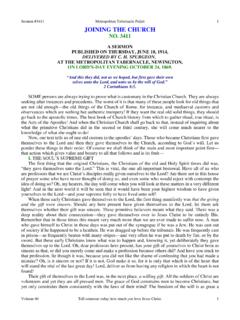Transcription of Don Bosco's Educational Method: The Preventive …
1 Don Bosco's Educational Method: The Preventive system What follows are the words of St. John Bosco to his Salesians as found in his writings. They refer to the treatment of the boys and young men who visited the Oratory every day. This same advice can be applied to the boys and girls in our Clubs Preventive system The system in use in our schools, as you know, is the Preventive system , which consists essentially in disposing the pupils to obey not from fear or compulsion, but from persuasion. In this system all force must be excluded, and in its place charity must be the mainspring of inspiration of my whole life, of my priestly efforts and ideals, has been my love for poor, abandoned youth. As all know, this is also the noble ideal of our Salesian Congregation. We are the friends of our boys. To learn how to command them, we must first learn to obey; and to make ourselves feared, we must first make ourselves loved.
2 Coping with Anger In dealing with the young, we must not allow the shadow of anger to darken our countenance. Self-control must rule our whole being our mind, our heart, our lips. Do you remember how Jesus answered those apostles who wanted him to call down fire and brimstone upon those cities that had refused to hear their teaching about him? He had only words of pardon for them."Let nothing disturb you!" was an expression often on the lips of St. Teresa. It is good Francis de Sales, that meekest of saints, never allowed his tongue to speak when his spirit was disturbed. "I am afraid," he once said, "to lose in a quarter of an hour that little sweetness that I have gathered up, drop by drop, like dew, in the vessel of my heart through the efforts of 20 years."Master your own character, and then you will succeed in mastering those of your pupils. Show them that uncontrolled emotion plays no part in your actions; they will respect you for that, and their respect will prompt their obedience.
3 But betray the least sign of weakness, of passion, of impatience, and your authority and prestige will not long endure. Besides, your punishment will not be taken as a remedy for the boy s fault, but as a vent for your own passion. It can bear no fruit!Even a slight flush of the countenance or a slight change in the tone of voice caused by anger betrays us and incites the boys to lose their esteem and confidence in us. Then all punishment is useless, because the boys feel that reason alone ought to be used in correcting Jesus before you. He patiently bore the ignorance and rudeness of his apostles. He had to put up with their faithlessness. The friendly hand he extended even to sinners aroused surprise in some and scandalized others. Yet his one interest was to inspire confidence and hope in the hearts of sinners. Well could he command us, then: "Learn of me, for I am meek and humble of heart." Ways to Make Yourself Loved Act like a caring father.
4 You will obtain anything from your children if they realize that you are seeking their own good. Act towards them as a good father who checks his children only from a sense of duty, when reason and justice clearly require be gentle and prudent. God will surely reward you if you are persevering in these virtues. He will make you the master of your children s hearts even when they are stubborn and for the thoughtlessness of youth, andBe alert for hidden motives. Boys often commit faults through thoughtlessness. At other times there are hidden motives for their misbehavior. On several occasions I have called some troublesome lads to order and, on inquiring with kindness why they persisted in being stubborn and self-willed, received as an answer, "That teacher has it in for me!" or "They re always picking on me, so I m giving them something to pick about!"To my surprise, I have found that such explanations were not always without foundation.
5 Often I hate to admit it we ourselves are partly to blame for the misbehavior of our pupils. Strange to say, those very teachers who are most exacting and who refuse to overlook even the slightest disobedience, are often the very first to ignore the advice of their own superiors. They themselves will forgive nothing, but they expect any fault of theirs to be entirely kindly. When the pupil is convinced that his superiors have high hopes for him, he is drawn back again to the practice of virtue. A kind word or a glance does more to encourage a child than a severe reprimand, which only serves to dampen youthful timely advice. A fatherly word in private is worth much more than reproach. Instill in the young the desire of reward or the thought of doing honor to their dear ones. In this way they are at times incited to acts of great often. If they fall into the same faults repeatedly, without losing sight of charity warn them in more serious terms, contrasting your own conduct towards them with theirs towards you.
6 Show them how concerned you are to save them from trouble and how little they repay your leniency toward to Correct a Child Never correct in public. Correct them with the patience of a father. Never, as far as possible, correct in public, but in private, apart from others. Only in cases of preventing or remedying serious scandal would I permit public corrections or indirect. Many times an indirect method of correcting is useful. For example, while in the presence of one at fault, speak to another about the folly of those who do lose their self-respect and good sense and so deserve make use of a third person to speak well of you to the offender, to advise him, to tell him what you cannot very well tell him yourself. Look for one who can more easily gain his some mark of affection. Sometimes, to obtain the amendment of our pupils it is enough to withdraw those marks of confidence and friendliness usually shown until the child is calm.
7 Never correct a boy while he is still under the influence of his own temper. A correction given at that time would only serve to embitter him and make things worse. Give him time to reflect, to enter into himself he will realize that he is wrong. Pick the best moment. Correct at the proper time, if you wish correction to do any good. I have often reflected on the story of Saint Paul s conversion. He had gone to the High Priest "breathing threats of slaughter against the disciples of the Lord." See how our Lord bides his time. He lets the persecutor give vent to his passion. He waits for him to complete his journey. Then at the very gates of Damascus, after Saul has had plenty of time for reflection, when he is far away from those who might encourage him to persist in his resolution to persecute the Christians, Jesus reveals himself in all his authority and power! By the strength of his meekness, he converts Saul s hatred and opens his eyes to his error; from a persecutor, Saul becomes the apostle of the to reason and responsibility.
8 Let the one you correct understand that you act out of duty and according to reason. Try to make him realize his fault and that it deserves punishment. Then mitigate it. In this way he will willingly accept a third party. If your first effort at correction proves unsuccessful, find out if there is someone else who has gained the confidence of the child. If so, let that person try correcting him. In the meantime, you should pray that some good may result from his optimistic. One last thing: when once you have gained the boy s heart, do not be content with merely inspiring him with the hope of forgiveness, but assure him that by his good conduct in the future he will make up for past correction with comfort. Correction at times brings about anxiety and fear. A word of comfort can easily offset this. A person who forgets and helps the culprit to forget is a true certain difficult moments, a humble prayer to God is much more useful than a violent outburst of anger.
9 Your children will certainly draw no profit from your impatience, and you will not impress anyone who may be watching you. A Word on PunishmentsI have often been asked and begged by my Salesians to set down various norms regarding the difficult matter of punishments. At times, a child seems to reap no fruit from our corrections, yet down deep in his heart a wonderful change is taking place. And this good effect would be entirely destroyed if we were to inflict some severe punishment on you might ask me here, just what punishments can we use? My dear friends, we should be prudent and sparing in our use of this means for obtaining discipline. If we are also kind and use our good judgment in employing punishments, we will obtain the desired effect the betterment of our youthful should be your last resort. In my long career as an educator, how often this has been brought home to me! No doubt it is ten times easier to lose our patience than to control it, to threaten a boy than to persuade him.
10 No doubt too, it is much more gratifying to our pride to punish those who resist us, than to bear them with firm kindness. Saint Paul often lamented how some converts to the faith too easily returned to their inveterate habits; yet he bore it all with patience as zealous as it was admirable. This is the kind of patience we need in dealing with the , indeed, punishes guilt but does not heal the guilty. With the young, punishment is whatever is meant as a punishment. In the case of some boys, a reproachful look is more effective than a slap in the face would be. Praise of work well done and blame in the case of carelessness are already a great reward or reproachful or severe look often serves as an excellent means of moral restraint over the young. By it the guilty person is moved to consider his own fault, to feel ashamed, and finally to repent and turn over a new , except in very extreme cases, expose the culprit publicly to shame.







